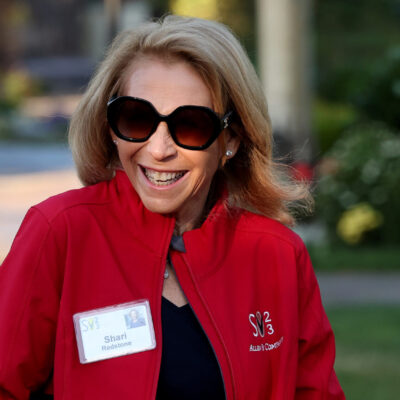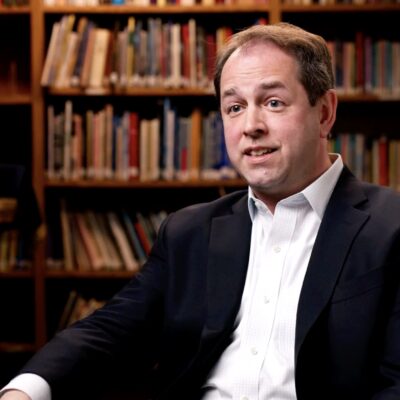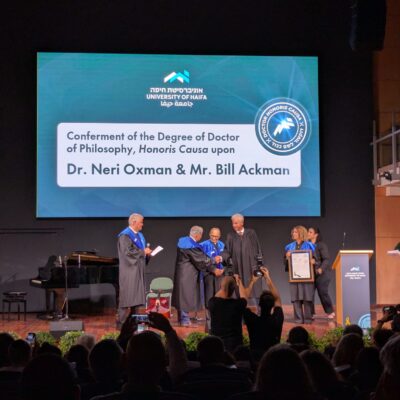Your Daily Phil: The view from Israel on American Jewry post-Oct. 7
Good Wednesday morning.
In today’s edition of Your Daily Phil, we cover the screening of a new Israeli documentary about American Jewry post-Oct. 7. We report on Hillel International’s expansion of its Campus Climate Initiative and a new survey by the American Jewish Committee on U.S. Jews’ views on antisemitism. We feature an opinion piece by Adi Vaxman offering lessons from her experience leading a nonprofit and a business, simultaneously; and one by Aaron Katler reflecting on the legacy of Joshua Venture following eJewishPhilanthropy’s recent retrospective on the groundbreaking fellowship. Also in this newsletter: Scarlett Johansson, Rebecca Weintraub Brendel and Julie Franklin.
What We’re Watching
The New York-based Gender Equity in Hiring Project is shuttering its doors in June due to insufficient funding, some three years before its intended 10-year run time, which founder and CEO Sara Shapiro-Plevan attributed to “cataclysmic events” in recent years that have shifted the Jewish community’s priorities.
The Jewish Federations of North America’s Center for Jewish Belonging is hosting a discussion this afternoon about how Jewish communities can be more welcoming for LGBTQ Jews.
What You Should Know
It was a scene that’s played out countless times over the past year and a half: A panel featuring experts and practitioners focused on the challenges and successes of American Jewry in general and in the aftermath of the Oct. 7 terror attacks in particular. They discussed antisemitism, Israel-Diaspora relations, “The Surge,” the functioning of large Jewish institutions, the role of parents in Jewish education — all fascinating and important, but also standard fare for these types of conversations. What set the event apart was this: The discussion was conducted entirely in Hebrew, the speakers were all Israeli and so was the audience (some dual nationals notwithstanding), reports eJewishPhilanthropy’s Judah Ari Gross from the event.
The panel was held last night at Anu: Museum of the Jewish People in Tel Aviv, following the premiere screening of “The New Jew: Days of War,” a documentary about American Jewish life in the wake of the Oct. 7 attacks, following up on a documentary series of the same name that was aired in Israel in 2021, which sought to explain American Jewry to an Israeli audience. Both the original and the new documentary are hosted by Israeli comedian Guri Alfi. An expanded version of the new documentary was broadcast in Israel late last year as a two-part series; it was condensed and updated for the new film version, which will now be shown in the United States.
The documentary examines the myriad ways that the Oct. 7 attacks and ensuing rise in global antisemitism have affected American Jewry. Alfi speaks with Jewish students from Ivy League schools about antisemitism on campus and with the parents of American-Israeli hostage Omer Neutra about American Jews’ efforts on behalf of the captives (the original interviews were conducted before the Israeli military determined that Neutra had been killed in the Oct. 7 attacks; this was added to the updated film). He also attends a Shabbat dinner in Atlanta organized through OneTable to discuss increased Jewish engagement and the rising number of conversions taking place post-Oct. 7.
Following the film, Moshe Samuels, CEO of the nonprofit Shazur and creator of “The New Jew,” moderated the panel discussion, which featured Alfi; philanthropist Shira Ruderman, whose foundation helped fund the production; World Zionist Organization President Tova Dorfman, whose organization also supported the series; and Na’ama Klar, director of the Koret International School for Jewish Peoplehood at Anu.
Ruderman and Dorfman — the two American-Israeli dual nationals on the panel — offered more critical views of American Jewry before and after Oct. 7, 2023. “I maintain that the ‘Golden Age’ [of American Jewry] has been in decline for years, in serious decline. But when things are good, you don’t want to look in the mirror” Ruderman said. “I think that Oct. 7 did not wake up American Jews enough, despite their thinking that it did.”
Dorfman, who moved to Israel from the U.S. at age 27, identified with the feeling that there was a “Golden Age” of American Jewry that she lived through, and which is now ending.
Alfi focus not on what American Jews should be doing but on what Israelis should be doing with regards to American Jews. “[Israelis] are always asking and demanding. Where does the dissonance with American Jews come from? We are demanding their sympathy, demanding their empathy, demanding that they stand behind us — and with no criticism, no nothing. That’s not what families do. That requires trust, and that trust can start with us,” he said. “How can it be that we don’t extend a hand to all our brothers and all our sisters in the Diaspora and say to them, ‘We’re here for you. We’re not superior to you, we’re not telling you to be Israel. Be you. What you are doing is great. What you are doing is important. The places, the things that you’ve built — it’s amazing. All of the genres of Judaism that you have created — it’s a wonderful thing. And we’re not judging you. How could we judge you when we haven’t been in your shoes?”
To which Dorfman quipped in response: “That won’t come from the Diaspora Affairs Ministry” — a reference to the government body’s at-times tense relationship with Diaspora Jewry and American Jewry in particular.
Turning back to American Jewry, Ruderman said despite “The Surge” in Jewish engagement post-Oct. 7, “the majority is still not showing up.”
Klar, however, reframed “The Surge” not in terms of a sudden rise in American Jews participating in Jewish institutions’ programs but as a rise “in demand in the hearts of people” for Jewish engagement. “It’s possible that in 50 years, we will have to ask that most annoying question, ‘Who is a Jew?’ and the answer will be: Whoever for whom Oct. 7 was felt in their heart. And if it didn’t for someone, maybe they need to do some introspection and think why do they not feel connected to the collective and where will they be with us in the future if at all,” she said.
Klar added that the responsibility for creating that feeling of connection to the Jewish people falls on parents. “Every mother and father — and grandfather and grandmother — has to be there for their child and grandchild to explain, what does it mean that you are Jews and that you are part of this mishpucha [family in Yiddish], this collective at this moment. No one can do that for them, and any parent that doesn’t have a good answer is leaving their child exposed,” she said.
CAMPUS BEAT
Hillel International doubles down on its Campus Climate Initiative, following spike in antisemitic incidents last year

Hillel International doubled down last week on its Campus Climate Initiative, a program focused on working with and educating university administrators on antisemitism, believing that this style of cooperation is the best path forward to protect Jewish students, despite some calls in the Jewish world for a more aggressive response. “Jewish people, Jewish leaders, have never had to confront this before. We have not developed, up until now, robust, targeted responses to a phenomenon of this scale,” Mark Rotenberg, Hillel’s senior vice president for university initiatives and one of the developers of the program, told eJewishPhilanthropy’s Nira Dayanim. “We just have to put the shoulder to the wheel here and commit ourselves to sticking with this program and normalizing concern for Jewish student needs at the highest levels of colleges and universities. That’s really the only way that we’re going to see long term improvements in the climate for our students.”
Data and training: Last week, Hillel kicked off the sixth annual cohort of the Campus Climate Initiative, bringing more than 100 university administrators from 19 campuses to Washington for a conference. By collecting data, convening university administrators for learning and training opportunities and providing recommendations, CCI — which started in 2020 with seven schools — hopes to bridge gaps in understanding about antisemitism that Hillel believes has prevented universities from adequately protecting Jewish students, particularly over the past 16 months. “The encampments and the vandalism and the obstruction of buildings and, frankly, criminal activity that was going on in these campuses last winter and spring was something that caught almost all administrators by surprise,” Rotenberg said. Since then, dozens of campuses across the country have adjusted their time, place, and manner policies related to protest activity and free speech. According to Rotenberg, around half of them are schools that work with CCI.
SURVEY SAYS
AJC poll: American Jews disapprove both Republicans’ and Democrats’ handling of antisemitism

A majority of American Jews — 59% — disapprove of how the Democratic Party has handled antisemitism, according to a new American Jewish Committee survey of Jewish attitudes towards antisemitism. Despite most Jews identifying as Democrats, slightly more viewed the GOP’s handling of antisemitism favorably, though most respondents — 54% — still gave the Republicans an unfavorable rating, reports Josh Kraushaar for eJewishPhilanthropy’s sister publication Jewish Insider.
Broad dissatisfaction: The poll found a national environment where American Jews feel antisemitism is on the rise, though most said they haven’t personally been the victim of an antisemitic attack or harassment. Over half of American Jews (53%) said antisemitism is a “very serious problem” — up 16 points in the last six years. More than half of American Jews (56%) said they have also avoided identifying themselves as Jews publicly — a significant rise since 2022, when 38% said they changed their behavior to keep their identity private. The poll also found that the American Jewish community’s support for Israel remains broad and deep. Eighty-one percent of American Jews said that caring about Israel was “very important” (51%) or “somewhat important” (30%) to them — in line with polling on the issue in recent years. Among Gen Zers between the ages of 18-29, 40% said Israel was “very important” to them — an 11-point jump over the last year.
Read the full report here and sign up for Jewish Insider’s Daily Kickoff here.
Speaking of polls…: A new survey by The Jewish Majority found that American Jews overwhelmingly oppose the protest tactics used by Jewish Voice for Peace against the war in Gaza, with 70% of respondents saying that anti-Zionist movements are antisemitic by definition, reports Jewish Insider’s Haley Cohen.
GET OUT OF THE BOX
When worlds collide: Unexpected lessons from running both a business and a nonprofit

“We tend to put businesses and nonprofits in separate boxes: one chases profits, while the other pursues a mission. But what if these boxes are in fact holding back both types of organizations? What if a business could grow faster by borrowing ideas from charities, and a nonprofit could help more people by thinking like a startup? I discovered this firsthand by running two very different organizations at once,” writes Adi Vaxman, founder and president of Operation Israel and CEO of Sheba Consulting, in an opinion piece for eJewishPhilanthropy.
Shaking things up: “Sheba Consulting is a business that helps other businesses grow, and Operation Israel is a nonprofit that provides life-saving equipment to IDF soldiers. At first, it felt like living in two different worlds, but the more I worked in both the more I realized something surprising — when you look past the surface, successful organizations often face the same challenges and require similar solutions… I’ve watched business strategies transform how we deliver humanitarian aid, and I’ve seen nonprofit approaches revolutionize how my clients’ companies grow. Several key areas stand out where businesses and nonprofits can learn from each other in taking action and showing impact, in logistics and in partnerships. Understanding this can change how we think about what makes organizations truly successful — and it has nothing to do with whether they’re trying to make money or make a difference.”
READER RESPONDS
The ripple effect of Jewish social innovation

“Kudos to Jay Deitcher for his thoughtful reflection on Joshua Venture’s legacy in eJewishPhilanthropy (“25 years after launching, the now-shuttered Joshua Venture still making waves through Jewish world,” Feb. 7). His article captures something powerful: the way a single investment in bold Jewish leadership can create ripples that extend far beyond what anyone could have imagined at the time,” writes Aaron Katler, CEO of UpStart, in an opinion piece for eJewishPhilanthropy.
Who is wise? He who sees the future: “In 2017, Joshua Venture merged with UpStart, Bikkurim and PresenTense to build something even bigger. The result? A support system that now fuels more than 200 Jewish ventures, organizations that are actively shaping the Jewish future. Many of them are solving problems we couldn’t have predicted a decade ago: keeping communities connected through the COVID-19 pandemic; responding to the post-Oct. 7 reality; and ensuring that Jewish life remains strong in ways that feel urgent and necessary. What’s striking about this story is how it proves a fundamental truth: the best investments in Jewish life are the ones that anticipate what we can’t yet see. It’s easy to fund what’s already established, what feels safe. What actually moves us forward, however, are the risks — the bets placed on visionary leaders who sense where the world is going before the rest of us do. The Jewish community has been the beneficiary of those bets for 25 years. The real question is: Will we continue making them?”
Worthy Reads
Lethal Irony: In The Jerusalem Post, Alex Winston shares details from the life of Shlomo Mantzur; originally listed to be released during the first stage of the hostage deal with Hamas, it was revealed yesterday that the octagenarian from Kibbutz Kissufim was murdered on Oct. 7 and his body is being held in Gaza. “Surviving the Farhud pogrom in Baghdad in 1941, Mantzur sought refuge in Israel. Aged 15, his family recalled how he lived in a hut before moving to Kissufim. Mantzur was among the founders of the kibbutz. Known as a dedicated worker, he worked in its chicken coop and eyewear factory. As a hobby, he learned carpentry and jewelry making… Mantzur was kidnapped by Hamas terrorists in front of his wife, and driven to Gaza in his own car… The kibbutz co-founder was an example of the pioneering spirit that led Israel’s development through its early years, contributing to the nation’s growth and embodying the spirit of those who believed in a safe haven for Jews. Yet, decades later, the very sanctuary he trusted failed to protect him from the same hatred he once fled… The State of Israel owes it to its citizens — many of whom fled antisemitism across the world to live in the Jewish land — to ensure their safety and uphold the promise of a secure homeland.” [JPost]
Cancel Culture is Canceled: In The Atlantic, Thomas Chatterton Williams remarks on a cultural shift in the U.S. that is seeing both public figures and the faceless masses on the internet eschew political correctness with relish. “If a vogue for virtue signaling defined the 2010s and early 2020s, peaking in 2020 during the feverish summer of protest and pandemic — a period in which pronouns in bio, land acknowledgments, black squares, diversity statements, and countless other ethical performances became a form of social capital — something like the exact photonegative of that etiquette has set in now… After a decade and a half of progressive dominance over America’s agenda-setting institutions — corporations, universities, media, museums — during which everyone was on the lookout for the scantest evidence of racism, sexism, xenophobia, transphobia, and every other interpersonal and systemic ill, it is not at all frivolous to ask what has been achieved. What, to put it bluntly, was all that cancel culture for? If the genuine but ill-conceived goal was to create a kinder, friendlier, more inclusive and equitable world for all (often paradoxically by means of shaming, coercion and intimidation), the real-world effect has been an abysmal rightward overcorrection in which norms of decency have been gleefully obliterated.” [TheAtlantic]
Get Back in the A.I. Game: Before it was under the purview of venture capitalists and tech bros, philanthropy spent hundreds of millions on artificial intelligence as a nonprofit research field, reports Sara Herschander in The Chronicle of Philanthropy. “Yet philanthropy’s most consequential contribution came in 2015 with the creation of OpenAI as a nonprofit, albeit one dominated with figures from the venture capital world. Founded in 2015 by some of the tech world’s biggest and deepest-pocketed stars, OpenAI received about $137 million in donations in its first four years, roughly a third of which came from [Elon] Musk. The group’s nonprofit status — and a charter that promised to avoid a long-term ‘competitive race without time for adequate safety precautions’ — had inherent appeal to some of the field’s premier researchers, many of whom feared existential risks from unchecked A.I. growth… Rising costs — and the aim to release a highly competitive product — led to OpenAI’s controversial decision in 2019 to restructure into a ‘capped-profit’ company governed by a nonprofit board… While corporate investment in A.I. continues to surge with big tech companies planning to spend tens of billions on A.I., many argue that philanthropy still has an important role… ‘You’re not going to be building data centers like Stargate, but that’s never been the role for philanthropy anyway,’ [CEO of Omidyar Network Mike] Kubzansky said. If you find ways to fill crucial gaps and provide the necessary counterweights to commercial interests, you don’t need as much money as the big dogs to be effective in this space.’” [ChronicleofPhilanthropy]
Word on the Street
British Jewry’s Community Security Trust released its tally of antisemitic incidents for 2024, finding that there were 3,528 instances of anti-Jewish hate recorded across the United Kingdom. This represents an 18% decrease from the 4,296 antisemitic incidents in 2023, while still being 56% higher than the next highest figure, 2,261 incidents in 2021…
The e-commerce platform Shopify has taken down Kanye West’s shop for violating its terms by selling swastika T-shirts…
Scarlett Johansson criticized the unapproved use of her likeness in an artificial intelligence-generated video purporting to show Jewish celebrities giving the middle finger to Kanye West for his latest antisemitic, pro-Nazi rants; Johansson, who stressed that she “has no tolerance for antisemitism or hate speech of any kind,” said she was more concerned with the risks posed by AI in spreading hate speech…
The Harvard Gazette interviews Rebecca Weintraub Brendel, director of Harvard Medical School’s Center for Bioethics, about end-of-life medical decisions and the role A.I. should play in them…
The governing bodies of the Reform, Conservative and Reconstructionist movements are among the religious groups suing the Department of Homeland Security to block immigration raids at houses of worship. The lawsuit, filed in federal court, challenges the President Donald Trump administration’s reversal of a policy barring ICE operations in “sensitive locations,” such as churches and synagogues…
President Donald Trump’s order last week of a review of federal funding for nongovernmental organizations to “align future funding decisions with the interests of the United States and with the goals and priorities” of his administration” has nonprofits on alert once again for potential cuts to federal support…
Conference of Presidents of Major American Jewish Organizations CEO William Daroff wrote to the leadership of the Senate Armed Services Committee raising “serious concerns” about the nomination of Elbridge Colby to be undersecretary of defense for policy…
Arnold Ventures has pledged $35.6 million to support the North Carolina Community College System’s (NCCCS) new NC Community Colleges Boost workforce development initiative in the largest-ever private grant to NCCCS…
Julie Franklin has been appointed board chair and Rena Kopelman vice chair for the Shabbat meal platform OneTable. Jill Aschkenasy, Victoria Kimerling Oliphant and Bruce Newman have been named as new board members…
Five hundred Hollywood figures including Michael Douglas, Mayim Bialik, Channing Dungey and Jennifer Jason Leigh are signatories on an open letter sent to University of California officials and civil leaders by the Jewish Federation Los Angeles calling on them to “unequivocally condemn” pro-Palestinian protestors’ attack on the house of UTA Vice-Chairman and UC Regent Jay Sures last week…
The Joan Yellen Horvitz Trust has donated $6 million through a bequest to the Cleveland Public Theatre. The largest gift since the theater’s founding in 1981, $4 million of the funds will be used to establish a new Joan Yellen Horvitz director fellowship and $2 million for renovating St. Mary’s Orthodox Church on CPT’s campus…
Mem Global has announced the opening of Israeli Culture Moishe Houses and Pods to foster connections between Israel and the diaspora, with the first two houses opening in Los Angeles and the San Francisco Bay area…
Two Australian health-care workers were placed on leave pending an investigation following the publication of a video in which the two threatened to kill Israeli patients, one of them bragging that he had already done so…
Jewish Telegraphic Agency spotlights the resurgence of Betar, a controversial Jewish group founded by early-20th century Revisionist Zionist Ze’ev Jabotinsky, advocating radical “Jewish self-defense” that sometimes turns violent…
A tribunal has overturned a UK Charity Commission disqualification order against National Jewish Assembly Chair Gary Mond, ruling in favor of his right to free speech. Mond was a trustee of the Jewish National Fund UK before the commission disqualified him in 2023 for social media posts it deemed could be perceived to be anti-Islam…
Pic of the Day

King Charles III (right) speaks yesterday with British Chief Rabbi Sir Ephraim Mirvis (third from left), Rabbi Josh Levy (left), Scottish Chief Imam Dr. Sayed Razawi (second from right) and Senior Imam Qari Asim MBE (second from left) and at Buckingham Palace in London after the signing of the Muslim-Jewish Reconciliation Accords (“The Drumlanrig Accord”).
“The Drumlanrig Accords represent a bold first step towards rebuilding a meaningful trust between Muslim and Jewish communities over the long term,” Mirvis said in a statement after the signing. “They do not gloss over our differences, they acknowledge them. But they also send out a powerful message that in times of division, when it is far easier to retreat into fear and suspicion, we are prepared to take the more challenging path to reconciliation. We do so not because it is easy, but because it is necessary.”
Birthdays

Best-selling author, Judy Sussman Blume…
Commercial director in the Inglewood and Beverly Hills offices of Keller Williams Realty, Gary Aminoff… Physician and public intellectual, he is a dean at Shalem College in Jerusalem and professor emeritus at the University of Chicago, Leon Richard Kass… Former prime minister of Israel, highly decorated IDF soldier and general, Ehud Barak… Periodontist in Newark, Del., Barry S. Kayne, DDS… Economist, physicist, legal scholar and libertarian theorist, his father was Nobel Prize-winning economist Milton Friedman, David D. Friedman… Computer genius, author, inventor and futurist, Ray Kurzweil… Grandmother of Aryeh, Gabby, Alex and Daniella, among others, Esther Dickman… Former president of Disney-ABC Television Group, Ben Sherwood… President and general counsel at The Louis D. Brandeis Center for Human Rights Under Law, Alyza Lewin… Film director, producer and screenwriter, Darren Aronofsky… Comic book author and illustrator, Judd Winick… Actress known for her voice work in animation, websites and video games, Tara Lyn Charendoff Strong… Comedian, actor, podcaster, writer and producer, Ari Shaffir… Principal deputy national security advisor throughout the Biden administration, Jon Finer… Deputy director for external affairs and communications at the Troy, Mich.-based Kresge Foundation, Christine M. Jacobs… Former MLB player, he is now the program director and owner of London, Ontario-based Centrefield Sports, Adam Stern… Columnist for The Wall Street Journal for 17 years through this past December, Rachel Feintzeig… Deputy solicitor general of New Jersey, he previously clerked for Justice Sonia Sotomayor, Michael Zuckerman… New York regional director for the American Jewish Committee, Joshua Kramer… Syndicated political columnist and senior editor-at-large for Newsweek, Josh Hammer… Israeli actress, best known as ADA Samantha Maroun on “Law & Order,” Odelya Halevi… Senior advisor in the Bureau of Global Public Affairs at the State Department during the Biden administration, Megan Apper… Counsel in the international trade group at Crowell & Moring, Jeremy Iloulian… PR and communications manager at Cravath, Swaine & Moore, Anna Miroff…


 Add EJP on Google
Add EJP on Google






